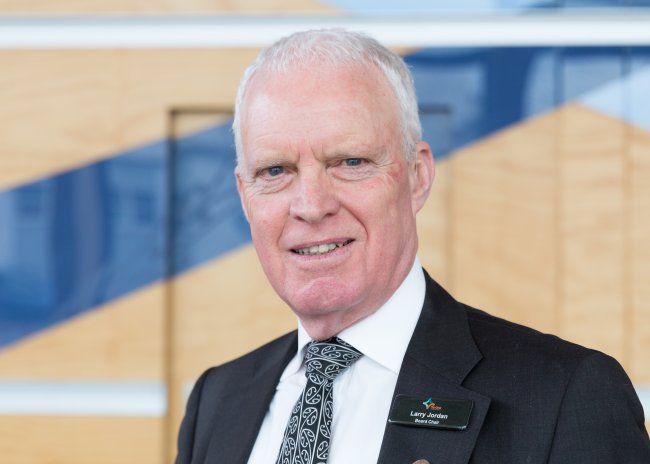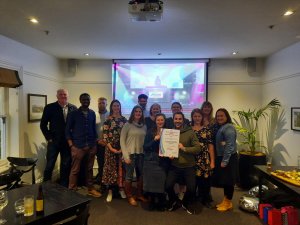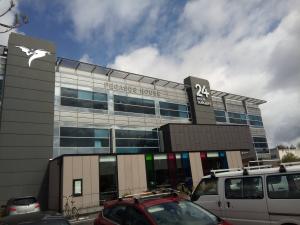Respiratory physician Lutz Beckert considers chronic obstructive pulmonary disease management, including the prevention of COPD, the importance of smoking cessation and pulmonary rehabilitation, and the lifesaving potential of addressing treatable traits. He also discusses the logic of inhaler therapy, moving from single therapy to dual and triple therapy when indicated, as well as other aspects of management
Compass in the black, keeps corporates out
Compass in the black, keeps corporates out

We are on our summer break and the editorial office is closed until 17 January. In the meantime, please enjoy our Summer Hiatus series, an eclectic mix from our news and clinical archives and articles from The Conversation throughout the year. This article was first published in the 15 December Summer edition
Tū Ora Compass Health ended the year in the black after extra COVID-19 income saw it turn around last year’s small deficit.
The Wellington regional primary care network made a $920,644 operating surplus in 2020/21 after receiving more than $8 million more in revenue, chief executive Justine Thorpe told the annual general meeting earlier this month.
The pandemic response contributed 9 per cent of revenue.
Ms Thorpe told the AGM nearly $640,000 of the surplus had been placed in a reserve for primary care development projects.
She says despite the challenges of COVID-19 and the vaccination rollout, the network and practices have continued to deliver on a diverse portfolio of contracts and services.
Highlights include:
- strengthening relationships with mana whenua
- maintaining a focus on childhood immunisation
- 43 of the network’s practices being in the Health Care Home programme
- the network’s 57 practices delivering 1.5 million consultations to patients.
The PHO has almost doubled its size as an organisation, says Ms Thorpe. It employs more than 120 COVID-19 related staff, most of these as casual and fixed-term workers, including swabbers, call-centre staff and history-takers.
Ms Thorpe and board chair Larry Jordan thanked and farewelled former chief executive Martin Hefford, who left the role in August, after leading Tū Ora for nine years.
Giving the guest speaker address at the annual meeting, Mr Hefford pointed to the PHO’s general practice ownership and support arm, Latitude.
One of the aims of the not-for-profit subsidiary Latitude, was to keep practices in clinical ownership and sell back shares to clinicians when possible, says Mr Hefford, who is interim chief executive of Health New Zealand.
“It’s been remarkably successful,” he says.
Corporates “say they can’t get in there, and I think that’s a good thing. I think clinical ownership, community ownership, those are the right models for general practice into the future.”
Latitude made a profit of $77,562 in 2020/21.
Mr Hefford says he was proud of the PHO’s work in mental health, including the award-winning programme Piki, and embedding health improvement practitioners, mental health coaches and other mental health roles into general practices.
A theme during his time at Tū Ora was trying to move resources into the front line, for example, in new roles such as practice assistants, pharmacists in general practice, and outreach nurses.
“It’s been the longest job I’ve had in my life and the best job I’ve had in my life,” he says.
Kate Fairbrother, a doctor at Raumati Road Surgery in Kāpiti, was elected as the board’s network provider representative.
Other board changes included welcoming Kiri Rikihana (Ngāti Raukawa ki te Tonga, Te Ati Awa ki Whakarongotai, Ngāti Toa Rangatira), deputy chief executive of the Medical Council, as chair of the refreshed hauora Māori committee and as a Māori representative on the board.
This year the board got its first apprentice, specialist GP Nick Wright, of Brooklyn, Wellington.
Dr Jordan, a specialist GP at Whitby, will continue as chair while the board plans his replacement.
We're publishing this article as a FREE READ so it is FREE to read and EASY to share more widely. Please support us and our journalism – subscribe here








![Barbara Fountain, editor of New Zealand Doctor Rata Aotearoa, and Paul Hutchison, GP and senior medical clinician at Tāmaki Health [Image: Simon Maude]](/sites/default/files/styles/thumbnail_cropped_100/public/2025-03/Barbara%20Fountain%2C%20editor%20of%20New%20Zealand%20Doctor%20Rata%20Aotearoa%2C%20and%20Paul%20Hutchison%2C%20GP%20and%20senior%20medical%20clinician%20at%20T%C4%81maki%20Health%20CR%20Simon%20Maude.jpg?itok=-HbQ1EYA)
![Lori Peters, NP and advanced health improvement practitioner at Mahitahi Hauora, and Jasper Nacilla, NP at The Terrace Medical Centre in Wellington [Image: Simon Maude]](/sites/default/files/styles/thumbnail_cropped_100/public/2025-03/2.%20Lori%20Peters%2C%20NP%20and%20advanced%20HIP%20at%20Mahitahi%20Hauora%2C%20and%20Jasper%20Nacilla%2C%20NP%20at%20The%20Terrace%20Medical%20Centre%20in%20Wellington%20CR%20Simon%20Maude.jpg?itok=sUfbsSF1)
![Ministry of Social Development health and disability coordinator Liz Williams, regional health advisors Mary Mojel and Larah Takarangi, and health and disability coordinators Rebecca Staunton and Myint Than Htut [Image: Simon Maude]](/sites/default/files/styles/thumbnail_cropped_100/public/2025-03/3.%20Ministry%20of%20Social%20Development%27s%20Liz%20Williams%2C%20Mary%20Mojel%2C%20Larah%20Takarangi%2C%20Rebecca%20Staunton%20and%20Myint%20Than%20Htut%20CR%20Simon%20Maude.jpg?itok=9ceOujzC)
![Locum GP Helen Fisher, with Te Kuiti Medical Centre NP Bridget Woodney [Image: Simon Maude]](/sites/default/files/styles/thumbnail_cropped_100/public/2025-03/4.%20Locum%20GP%20Helen%20Fisher%2C%20with%20Te%20Kuiti%20Medical%20Centre%20NP%20Bridget%20Woodney%20CR%20Simon%20Maude.jpg?itok=TJeODetm)
![Ruby Faulkner, GPEP2, with David Small, GPEP3 from The Doctors Greenmeadows in Napier [Image: Simon Maude]](/sites/default/files/styles/thumbnail_cropped_100/public/2025-03/5.%20Ruby%20Faulkner%2C%20GPEP2%2C%20with%20David%20Small%2C%20GPEP3%20from%20The%20Doctors%20Greenmeadows%20in%20Napier%20CR%20Simon%20Maude.jpg?itok=B0u4wsIs)
![Rochelle Langton and Libby Thomas, marketing advisors at the Medical Protection Society [Image: Simon Maude]](/sites/default/files/styles/thumbnail_cropped_100/public/2025-03/6.%20Rochelle%20Langton%20and%20Libby%20Thomas%2C%20marketing%20advisors%20at%20the%20Medical%20Protection%20Society%20CR%20Simon%20Maude.jpg?itok=r52_Cf74)
![Specialist GP Lucy Gibberd, medical advisor at MPS, and Zara Bolam, urgent-care specialist at The Nest Health Centre in Inglewood [Image: Simon Maude]](/sites/default/files/styles/thumbnail_cropped_100/public/2025-03/7.%20Specialist%20GP%20Lucy%20Gibberd%2C%20medical%20advisor%20at%20MPS%2C%20and%20Zara%20Bolam%2C%20urgent-care%20specialist%20at%20The%20Nest%20Health%20Centre%20in%20Inglewood%20CR%20Simon%20Maude.jpg?itok=z8eVoBU3)
![Olivia Blackmore and Trudee Sharp, NPs at Gore Health Centre, and Gaylene Hastie, NP at Queenstown Medical Centre [Image: Simon Maude]](/sites/default/files/styles/thumbnail_cropped_100/public/2025-03/8.%20Olivia%20Blackmore%20and%20Trudee%20Sharp%2C%20NPs%20at%20Gore%20Health%20Centre%2C%20and%20Gaylene%20Hastie%2C%20NP%20at%20Queenstown%20Medical%20Centre%20CR%20Simon%20Maude.jpg?itok=Z6u9d0XH)
![Mary Toloa, specialist GP at Porirua and Union Community Health Service in Wellington, Mara Coler, clinical pharmacist at Tū Ora Compass Health, and Bhavna Mistry, specialist GP at Porirua and Union Community Health Service [Image: Simon Maude]](/sites/default/files/styles/thumbnail_cropped_100/public/2025-03/9.%20Mary%20Toloa%2C%20Porirua%20and%20Union%20Community%20Health%20Service%20in%20Wellington%2C%20Mara%20Coler%2C%20T%C5%AB%20Ora%20Compass%20Health%2C%20and%20Bhavna%20Mistry%2C%20PUCHS%20CR%20Simon%20Maude.jpg?itok=kpChr0cc)